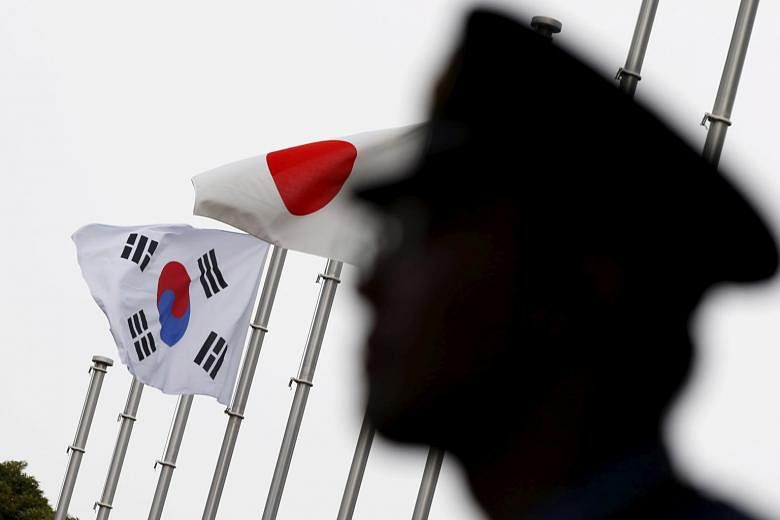The famous Japanese movie Rashomon is known for a plot device that involves various characters providing subjective and contradictory versions of the same incident. Ironically, the movie plot seems to mirror the diverging views of the aggressor and the victims of the unfortunate past between Japan and its neighbours.
On Sept 9, Japan's then Foreign Minister and current Defence Minister Kono Taro contributed an opinion article titled "The background to recent Japan-Republic of Korea disputes", (The Straits Times) whereby he blamed Japan's recent falling-out with South Korea on the latter's breach of the 1965 Agreement on claims settlement. Japan has also argued that Tokyo's recent export restrictions against South Korea had nothing to do with this supposed breach.
Both claims are disingenuous and unfounded. Before refuting these arguments, I would first like to recall what is at the heart of all these issues - Japan's unwillingness to fully come to terms with the past.
A wise statesman once advised to "never ruin an apology with an excuse". As victims of the Japanese Occupation and having suffered the atrocities of terror, Singapore and the broader surrounding region are no strangers to the meaning of this wise advice.
For South Korea, Japan's closest neighbour and victim, the wounds left by the aggressor only run deeper.
Japan asks how many times it must apologise. The country's leaders have made some apologies over the years. Yet, rarely have they been spontaneous or heartfelt.
Instead, they've been maximally choreographed, with Japan insisting on crossing every "t" and dotting every "i" - not the ideal way to convey remorse. Even such half-hearted statements are walked back time and again.
A senior Japanese official even remarked that some parents of "comfort women" had sold off their daughters to Japan's military brothels. Such cruel, dismissive words have become a fixture of South Korea-Japan relations, uttered regularly not only by Japan's fringe, but too often by the heavy hitters of Japanese politics and government.
Against this hurtful background, consider the accusation that South Korea is violating the 1965 Agreement. The fundamental gap between South Korea and Japan concerns what the Agreement covers.
Japan's position is that the 1965 Agreement addressed each and every claim stemming from the colonial period. A particular point of contention is whether the Agreement prevents the right of South Korean forced labourers to claim compensation for psychological suffering against Japanese companies, which had committed unlawful acts against humanity, directly linked to Japan's illegal colonial rule of South Korea and its war of aggression.
Japan has maintained that these labourers, who were forced to toil away under the most inhumane conditions in support of imperial Japan's war machinery, willingly and legally signed up for the work and are thus foreclosed by the Agreement from seeking compensation.
South Korea rejects this argument. The 2018 Korean Supreme Court ruling at the heart of the current discord simply reaffirmed that the 1965 Agreement does not cover what Japan refused to cover.
Japan has never accepted legal responsibility for its brutal subjugation of South Korea, and thus this element was not reflected in the Agreement. Therefore, the Supreme Court ruled that individuals still have the right to seek redress for unlawful acts against humanity directly linked to Japan's illegal colonial rule.
We reject Japan's insistence that the South Korean government, by respecting this judicial decision, has abrogated the 1965 Agreement.
Furthermore, in 1991, a senior Japanese Foreign Ministry official clearly affirmed that individuals' right to claim reparations had not been extinguished by the 1965 Agreement. This encouraged South Korean victims of forced labour to try their cases in Japan. The Japanese courts rejected their claims so they brought their cases home.
Japan also asserts that South Korea's alleged mishandling of sensitive goods left it with no choice but to adopt unilateral export restrictions against one of its closest trading partners - a claim Japan could not substantiate.
In fact, the Washington-based Institute for Science and International Security ranks South Korea's control system above Japan's. The real motive behind the measures is glaringly obvious: to punish South Korea for the Supreme Court's ruling through unrelated means aimed with laser precision at taking out its core industries.
Japan was the one to first link security and export licensing issues, but framed it as an "update" to its licensing policies and procedure for exports, and rather laid blame on South Korea for linking the two issues.
If, as Japan claims, South Korea is an untrustworthy security partner, it is a logical corollary that we cannot trust each other in handling the much more sensitive military intelligence.
Despite our differences over history, South Korea is ready to engage in honest dialogue with Japan. One silver lining of the recent feud is that it has revealed just how closely the two countries are interlinked.
We hope that Japan can withdraw its economic retaliation against South Korea and honestly face the past, so that we may begin the process of putting this unfortunate period in our relations behind us.
• Yoon Soongu is the Deputy Minister for Foreign Affairs of the Republic of Korea.

